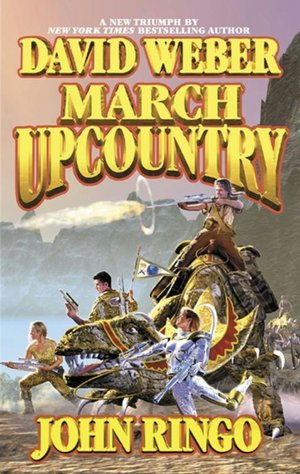When March Upcountry published in 2001, David Weber was well-established in Military Science Fiction, with nine books of his Honor Harrington saga plus an additional 10 novels published. In short, he was a Military SF brand name. John Ringo, his ‘apprentice’ partner in crime for March Upcountry, was a relatively new writer, having published the first two books of his Legacy of Aldenata/Posleen War series. For Ringo the rest, as they say, is history.
So, onto the story itself the novel is set in a far future where humanity has expanded to other planets throughout the galaxy and the governmental body has become an Empire, which is ruled by Empress Alexandra from her throne on Earth. Her afterthought of a son, the foppish Prince Roger, is sent to the planet Leviathan to represent the Empire in a flag raising ceremony. He knows he’s not very respected within and outside of his family, but Roger sees this charge below his princely standing. On the way to the backwater planet Leviathan, Prince Roger’s ship is sabotaged, he and his regiment of Royal Marines are forced to land on the planet Marduk which is inhabited by a civilization far less advanced than humanity, humanoids with four arms inventively referred to as Mardukian. In addition, Marduk is home to large, savage beasts.
The Marines are led by Captain Armand Pahner who initially shows little patience for the willful prince. If anything, the Prince’s brash nature is seen by Pahner as an impediment to the mission of keeping the Prince alive on their mission across the globe to a space port. Kostas “Mouse” Matsugae, Prince Roger’s manservant, is the closest thing the Prince has to a friend. When one of those aforementioned savage beasts, the size of an elephant, charges the regiment, Roger’s great skill as a hunter comes to the fore; he kills it, in the process saving the life of the Mardukian D’Nall Cord who, as a result, owes the Prince a life debt. In addition to those stage-front characters, Weber and Ringo populate the novel with a fair range of additional characters from the Marines, the Mardukians from Cord’s tribe, as well as Mardukians from tribes at war with Cord.
In some ways, I’d say March Upcountry is a more military-flavored take on Lois McMaster Bujuold’s Miles Vorkosigan saga, specifically some of the superficial similarities between Prince Roger and Miles himself the arrogance, the seeming foppishness, and how both Roger and Miles are often underestimated. Roger’s character evolves in March Upcountry, lending hints of a bildungsroman to the novel. As a royal prince, the tools for him to learn and become something special have always been at his disposal. Only when his life is at stake and he’s in dire circumstances does Roger begin to exhibit maturity.
The Empire and royalty of Prince Roger combined with the barbaric civilization and strange monsters/creatures lend an edge of fantasy to the novel. Those elements are window dressing to the core of the story the military mission to get Roger safely to the space port. The military aspect, as well as the advanced space travel, power armor, advanced medical and communication technologies, and some of the biological examinations of the life on Marduk place the novel squarely in the Military Science Fiction subgenre. I don’t personally have military experience, but Ringo does, so I assume the verisimilitude of the trudging life of a military unit in foreign circumstances comes from him.
Since the publication of March Upcountry and those first two Aldenata novels, Ringo has become another “brand name” in Military SF, whose popularity within Baen is possibly second only to David Weber. Ringo has since gone on to author (or co-author) almost three dozen novels in the past decade while Weber pushes out at least a book a year, and often multiple books a year. That is the “history” to which I referred in my opening paragraph. Though I haven’t read any other novels by John Ringo (soon to change with a few queued up on my Kindle), I’ve become a David Weber fan, particularly his Safehold saga, where similar themes—like blending elements of science fiction and fantasy as well as human government as an Empire—can be seen.
In the end, March Upcountry is just the start of a grand series, which became the first book in the Empire of Man series, that helped to launch John Ringo into the Military SF stratosphere and enhance David Weber’s already prominent position. The only negative I can level at the novel is the narrative gets a bit cramped with details, which slows the pace. Otherwise, the book is entertaining, and believable in the military aspects as well as some of the advanced technology presented. This book has encouraged me to read more of John Ringo’s fiction, and has given me greater encouragement to continue reading through David Weber’s backlist including March to the Sea, the sequel. If those last statements aren’t an appreciation of March Upcountry, then I’m not sure what is.
Robert H. Bedford is a lifelong a fan and reader of speculative fiction. He has a blog and, for about a decade, he has been contributing reviews and interviews and moderating the discusson forums at SFFWorld. He lives in New Jersey with his wife and dog.










